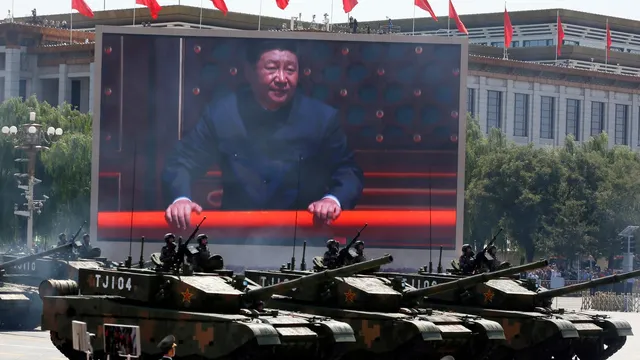
China prepares military parade to showcase new weaponry
2025-06-24 06:13- China will hold a military parade on September 3, 2025, marking the 80th anniversary of Japan's World War II surrender.
- President Xi Jinping will oversee the event showcasing advanced military technologies, including hypersonic weapons.
- The parade symbolizes China's growing military power and its intentions regarding Taiwan and the Asia-Pacific region.
Express your sentiment!
Insights
On September 3, 2025, China will hold a significant military parade in Beijing to commemorate the 80th anniversary of Japan's surrender in World War II. This event will highlight the advancements made by the People's Liberation Army (PLA), which is the largest standing military force in the world, boasting over 2 million members. President Xi Jinping, who is also the head of the military, is set to deliver an important speech during this parade. The event will feature impressive displays of modern combat capabilities, including hypersonic weapons and sophisticated electronic gear, showcasing an evolving technological approach to warfare. Military parades in China traditionally reflect national pride and serve as a demonstration of military strength. These parades have become annual events to commemorate significant historical milestones, such as the anniversary of the People's Republic's founding in 1949 and the anniversary of the PLA's establishment. For Xi Jinping, hosting such parades is a critical aspect of leadership, as they not only celebrate historical events but also project China's military prowess on a global stage. According to Wu Zeke, a senior PLA officer, the inclusion of cutting-edge weaponry in the parade illustrates the PLA's adaptability and readiness for modern combat scenarios. The emphasis on innovative armament demonstrates China's commitment to strengthening its defense capabilities and preparedness for potential conflicts, especially with Taiwan, that China considers a part of its territory. Over the years, China has focused on upgrading its military technology to compete with the United States and reinforce its status as the primary military power in the Asia-Pacific region. This parade undoubtedly aims to send a clear signal to international observers about China's military evolution and its strategic intentions moving forward. As tensions surrounding Taiwan continue to rise, this event can also be interpreted as a reminder of China's historical grievances and its readiness to confront them militarily if necessary. The military showcase on September 3 is expected to attract significant attention globally, with analysts closely observing how China presents its military capabilities in light of ongoing geopolitical challenges.
Contexts
The anniversary of Japan's surrender in World War II holds significant historical and cultural importance, marking a pivotal moment in global history. This event, which took place on August 15, 1945, effectively ended the conflict in the Pacific and ushered in a new era for Japan and the world. The surrender was a result of extensive military engagement, but it also followed the catastrophic bombings of Hiroshima and Nagasaki, leading to the realization of the dire consequences of continued conflict. Understanding the circumstances surrounding Japan's decision to surrender helps us reflect on the devastation of war and the importance of diplomatic resolutions in international relations. This anniversary serves not only as a reminder of the horrors of war but also as an opportunity for reflection and reconciliation. In Japan, it is observed as a day of mourning for the lives lost during the war, including Japanese soldiers and civilians, as well as the millions of people who suffered across Asia due to wartime aggression. The narrative of the war's end is complex, encompassing the perspectives of different nations and peoples affected by the conflict. Commemorative services are held, during which citizens honor the fallen and grapple with the legacy of militarism that had brought the country to ruin. Moreover, the significance of this anniversary extends beyond mere remembrance; it also emphasizes the lessons learned from the past. In the decades since the end of World War II, Japan has transformed itself from a militaristic empire into a pacifist nation, with a constitution that renounces war as a means of settling international disputes. This shift has facilitated Japan’s integration into the global community, promoting peace and stability in the Asia-Pacific region. The anniversary thus reminds not only Japanese citizens but the entire international community of the need for enduring efforts toward conflict prevention and peacebuilding. As we approach the anniversary in 2025, it is crucial to engage dialogues that reflect on the past while advocating for a peaceful future. Events commemorating Japan's surrender can serve as platforms to foster understanding among nations, highlighting the importance of international cooperation and the pursuit of common goals. In a world still marred by violence and conflict, the lessons of World War II remain relevant, urging humanity to prioritize peace over militarism and seek collaborative solutions to complex global challenges.